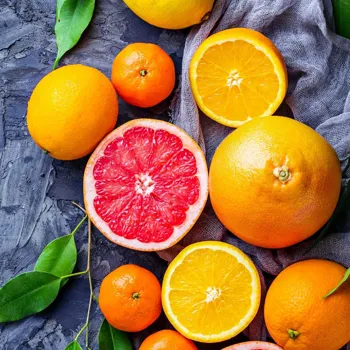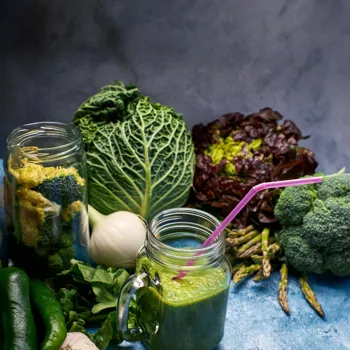Unlock the secrets to optimal health with these 7 essential vitamins and minerals. Dive in to discover what your body truly needs for vitality and well-being
Namaste, and welcome! In today's fast-paced
life, making sure we get the right nutrients can feel like climbing Mount Everest. But fear not! We’re here to break down the most important vitamins and minerals your body needs to function at its best.
Getting these essential nutrients through a balanced diet is key to feeling energetic, staying healthy, and even boosting your mood. Let's dive into the seven superstars of the nutrient world: Vitamin A, Vitamin C, Vitamin D, Vitamin E, B Vitamins, Calcium, and Iron.
Knowing about these can really make a difference to your well-being.
Vitamin A: See Clearly, Stay Strong
Vitamin A is not just one thing; it's a group of compounds important for many things. First and foremost, it's crucial for good vision, especially in low light. Remember your grandma telling you carrots are good for your eyes? She was right!
Vitamin A helps the retina (the back of your eye) work properly. Besides vision, Vitamin A plays a vital role in supporting your immune system. It helps your body fight off infections and keeps your skin healthy, acting as a barrier against germs.
It also helps in cell growth and development, making it important for overall health.
You can get Vitamin A from sources like leafy green vegetables like spinach and kale, orange and yellow vegetables like carrots and sweet potatoes, and even some fruits.
Eating a rainbow of colorful fruits and vegetables will usually ensure you get enough Vitamin A. If you're concerned you're not getting enough, talk to your doctor about whether a supplement is right for you.
But remember, too much Vitamin A can be harmful, So, it's always best to get it from food sources as much as possible. Prioritizing a balanced, colorful diet rich in these natural sources helps maintain overall well-being.
Vitamin C: Your Immunity Booster
Vitamin C is famous for its immune-boosting capabilities. It's a powerful antioxidant, which means it helps protect your cells from damage caused by free radicals. Free radicals are unstable molecules that can contribute to aging and various health problems.

Vitamin C also plays a key role in collagen production. Collagen is a protein that's essential for healthy skin, bones, and blood vessels. It's like the glue that holds everything together! Furthermore, Vitamin C helps your body absorb iron from plant-based foods.
Good sources of Vitamin C include citrus fruits like oranges and lemons, bell peppers (especially the red ones), strawberries, and broccoli. It's important to note that Vitamin C is water-soluble, meaning your body doesn't store it. Therefore, you need to get it regularly from your diet.
A daily dose of Vitamin C can make a real difference in keeping you feeling healthy and strong. Consider adding a glass of fresh lime juice to your daily routine for a refreshing and beneficial boost.
Vitamin D: The Sunshine Vitamin
Vitamin D is often called the "sunshine vitamin" because your body produces it when your skin is exposed to sunlight. However, many people don't get enough Vitamin D, especially during the winter months or if they spend a lot of time indoors.
Vitamin D is crucial for absorbing calcium, which is essential for strong bones and teeth. It also plays a role in immune function and may help protect against certain diseases. A deficiency in Vitamin D can lead to bone problems, fatigue, and a weakened immune system.
Apart from sunlight, you can get Vitamin D from fortified foods like some milk alternatives. It is difficult to get enough Vitamin D from food alone, so many doctors recommend taking a vitamin D supplement, especially during times when sun exposure is limited.
Consult with your doctor to determine the right dosage for you. Spending a little time outdoors and considering a supplement, as advised by your doctor, can help you maintain optimal Vitamin D levels for improved health.
Vitamin E: Antioxidant Powerhouse
Vitamin E is another powerful antioxidant that protects your cells from damage. It supports immune function, helps keep blood vessels healthy, and plays a role in maintaining healthy skin and eyes.
Vitamin E works by neutralizing free radicals, which are unstable molecules that can damage cells and contribute to aging and chronic diseases. It's like a bodyguard for your cells, protecting them from harm. This protective action helps keep your tissues healthy and functioning properly.
You can find Vitamin E in foods like almonds, sunflower seeds, and leafy green vegetables. Including these foods in your diet can help you meet your daily Vitamin E needs. Vitamin E is fat-soluble, so your body stores it.
However, it's still important to get enough of it through your diet every day. Enjoying a handful of almonds or adding sunflower seeds to your salad can be a simple way to boost your Vitamin E intake and support overall health.
B Vitamins: Energy and Brain Function
The B vitamins are a group of eight essential nutrients that work together to support energy production, brain function, and cell metabolism. They include thiamin (B1), riboflavin (B2), niacin (B3), pantothenic acid (B5), pyridoxine (B6), biotin (B7), folate (B9), and cobalamin (B12).
Each B vitamin plays a unique role in keeping your body functioning properly. They help convert food into energy, support nerve function, and are involved in the formation of red blood cells.
You can find B vitamins in a variety of foods, including whole grains, leafy green vegetables, nuts, seeds, and legumes. For example, folate (B9) is abundant in spinach and lentils, while B12 is found in fortified plant-based milks and nutritional yeast.
Getting enough B vitamins from your diet is crucial for maintaining energy levels, supporting brain health, and preventing deficiencies. If you're feeling tired or experiencing other symptoms of a B vitamin deficiency, talk to your doctor.
They may recommend a B complex supplement to help you meet your needs.
Calcium: Strong Bones and More
Calcium is well-known for its role in building and maintaining strong bones and teeth. However, it also plays important roles in muscle function, nerve transmission, and blood clotting. Your body needs calcium to perform many essential functions.

If you don't get enough calcium from your diet, your body will take it from your bones, which can weaken them over time. This can lead to osteoporosis, a condition that makes your bones brittle and more likely to fracture.
Good sources of calcium include dairy products such as milk and yogurt, as well as leafy green vegetables like kale and spinach. Fortified plant-based milks, such as almond milk and soy milk, are also excellent sources of calcium. Make sure to read the labels to ensure they are properly fortified.
Getting enough calcium from your diet is crucial for maintaining bone health and supporting other important bodily functions. A balanced diet that includes calcium-rich foods like leafy greens and fortified plant-based milks can help you meet your daily calcium needs and keep your bones strong.
Iron: Energy and Oxygen Transport
Iron is an essential mineral that's vital for transporting oxygen throughout your body. It's a key component of hemoglobin, the protein in red blood cells that carries oxygen from your lungs to your tissues and organs.
Without enough iron, your body can't produce enough healthy red blood cells, which can lead to iron deficiency anemia. Symptoms of iron deficiency anemia include fatigue, weakness, shortness of breath, and pale skin.
You can find iron in plant-based foods like lentils, spinach, and fortified cereals. To help your body absorb iron from plant-based sources, it's important to eat them with foods rich in vitamin C.
For example, enjoy a spinach salad with a squeeze of lemon juice or pair lentils with a side of bell peppers. Getting enough iron from your diet is essential for maintaining energy levels and supporting oxygen transport throughout your body.
If you're concerned about your iron intake, talk to your doctor. They may recommend an iron supplement to help you meet your needs.
So there you have it – seven essential vitamins and minerals that are crucial for optimal health.
Remember, a balanced diet rich in fruits, vegetables, whole grains, and healthy sources of calcium and iron is the best way to get these nutrients. Consult with your doctor to determine what's right for you. Stay healthy and stay happy!
AI Generated Content. Glance/InMobi shall have no liability for the content












